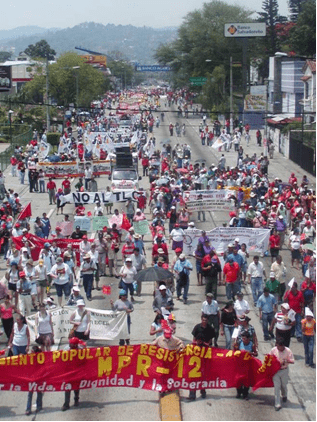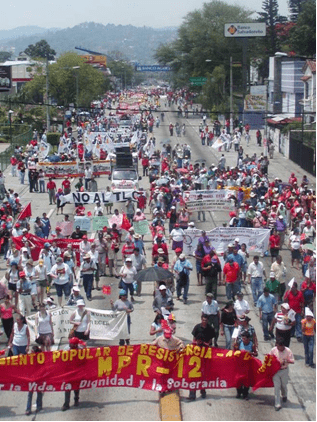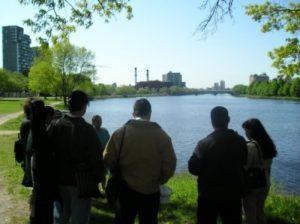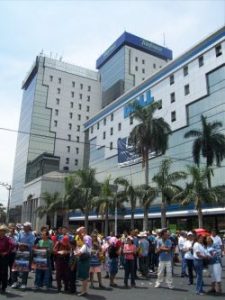Sister Cities
Haymarket, McArthur Park, and the Silence that still Speaks – May 1, 2007
Workers Day News, May 2007
Haymarket, McArthur Park, and the Silence that still Speaks
ES Staff
In 1884, labour unions in the United States and Canada set May first 1886 as the date when the eight hour workday should become law, what is today the recognized standard for a full work day. On that May first there were general labour strikes all around the United States, the largest in Chicago where an estimated 90,000 people participated, demanding the eight hour workday be respected. After a series of escalating incidents between strikers and the police, on May 4th during what had been a peaceful riot in Haymarket Square in Chicago, a bomb was thrown at police lines, killing one police officer. The police then opened fire on the masses, and in the ensuing turmoil a number of people where killed and countless injured, both civilians and police officers.
Eight strike leaders who had organized the massive protest of the fourth were charged not for throwing the bomb, but for inciting the guilty party to throw the bomb by their remarks to the crowds. The Chicago Eight’s defense lawyers argued that the Pinkerton National Security Agency, a private company hired by business leaders to infiltrate labour unions and instigate conflict, and a paid contractor of the State Department on occasion, had set the bomb. Nevertheless, seven of the eight defendants were sentenced to death, and the eighth was given 15 years: persecuted for demanding workers rights before big business interests, and daring to say so in public. Interestingly, six of the eight were immigrant workers.
The leader who had been addressing the crowd just prior to the riot, a German immigrant August Spies was hanged to death a year and a half later and is widely quoted as having shouted out immediately before his execution, “The time will come when our silence will be more powerful than the voices you strangle today.” That silence did indeed swell to a roar and May first has become international workers day, celebrated around the world everywhere where big business interests continue to come before the rights of the poor.
Those voices that were silenced continue to roar in El Salvador in commemoration of the 121 anniversary of Haymarket square, where an estimated 70,000 (numbers very similar to those in Chicago) marched from Salvador del Mundo to the Plaza Civica in Downtown San Salvador to demand economic justice, an end to government corruption, neglect of the poor, and repression. A coalition of social movements and the FMLN party organized the activity, marching in two lines extending for miles and composed of labour unions, students, and campesinos.

Lorena Martínez of the October 12th Popular Resistance Movement addressed the masses, saying, “The policies of the current Government only serve to impoverish us more every day, if we cannot strike them down through dialogue, we will overcome these policies written by the giant trans-national companies by taking to the streets.” August Spies couldn’t have said it better himself.
According to the Salvadoran Minister of the Economy’s most recent survey published in June 2006, there are 2 million 887 thousand poor in the country, roughly a third of the population. That number has grown by 545 thousand since 2004, during the Administration of ARENA president Tony Saca. Not surprisingly, 66 percent of the GDP remains in the hands big business, while the millions in poverty are left to vie for the remaining 36 percent of the GDP, nearly half of which comes from remittances, mostly from the nearly three million Salvadorans living in the United States. No wonder hundreds leave every day for the North, with the hope they can lift their family out of poverty through remittances.
The constant march Northward brings us back to May first, drawing circles in time: from Haymarket Square in Chicago, to the Plaza Civica in San Salvador, and back to McArthur Park in Los Angeles California, commonly referred to as the largest Salvadoran city anywhere. There, thousands of protesters took to the streets this year to demand an end to the raids on immigrants and respect for their basic rights, a vibrant example of an ongoing struggle for human rights before profits and trade agreements, the causes of such massive levels of immigration. As in Chicago so many years ago, protesters in L.A. were met in McArthur Park by police brutality and repression, a reminder that 121 years later doesn’t necessarily mean proportional progress towards human rights and free speech.
What Lorena Martinez of the MPR-12 said in downtown San Salvador would have been equally accurate in downtown Los Angeles, and the chants of “El pueblo, unido, jamás será vencido” (the people, united, will never be defeated) that could be heard last week could be heard from L.A. to San Salvador, and in so many other cities in Latin America and in the United States, where Latin American immigrants are carrying on a struggle other groups of immigrants before them began in the United States. Voice by voice they are breaking the silence of the undocumented and persecuted, and turning the silence of August Spies into a roar for human rights. Indeed, May first is yet another remainder of how the United States is a country built on the backs of the struggles of immigrants, from the English to the Dutch, to the Germans and the Irish, to the Mexicans and Central Americans. Today, Latin America is picking up the banners of the Chicago Eight, to hold them high in cities all over the hemisphere, and demanding human rights before profits. Its time we return to our immigrant roots of struggle. ¡Que viva!



